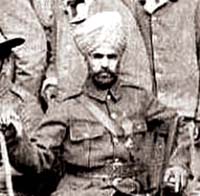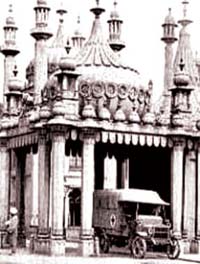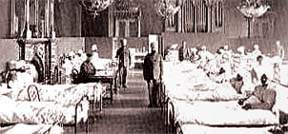Mar 14, 2025
Mar 14, 2025
by V. Sundaram
I am a lover of military history. I have seen the recent news item that Sonia Gandhi laid a wreath two days ago at the famous Indian Memorial at Menin Gate in Ieper (Ypres) at Brussels in Belgium saying it felt a shame to be alive when men so brave are dead. The Indian Memorial, dedicated to the sacred memory of the heroic Indian soldiers who laid down their lives defending the Channel Harbour and the territory of Belgium in the early years of I World War, was established by the Belgium Government on 10 November, 2002. In the early months of the war, Indian troops were dispatched to East Africa and Egypt, as well as to the western front, and by the end of 1914 more than 300,000 officers and men of the British Indian Army had been shipped to overseas garrisons and battlefronts. The government of India's immediate military support was of crucial importance in strengthening the western front, and an expeditionary force, including two fully manned infantry divisions and one cavalry division, were sent from India in late August and early September 1914. They were shipped directly to France and moved up to the battered Belgian line just in time for the First Battle of Ypres. The Indian Corps sustained extraordinarily heavy losses during the winter campaigns of 1914 - 15 on the western front. The British colonial myth of Indian racial inferiority, especially regarding courage in battle, was permanently dissolved in blood shed by heroic Indian soldiers on the battlefield of Flanders. This enabled the Indians to gain their entry into the final bastion of British Indian racial discrimination - the ranks of Royal Commissioned Officers. With proud thanksgiving, a mother for her children, The poem originally called For The Fallen is today known as 'The Ode of Remembrance'. 'The Ode' is still regularly recited on occasions such as Remembrance Day and Remembrance Sunday in the United Kingdom and Canada and ANZAC day in Australia and New Zealand, and adorns numerous war memorials including The Cenotaph in Whitehall. It is customarily read by an old soldier. In Australia's Returned and Services Leagues, it is read out nightly at 6 p.m. If I should die, think only this of me: To conclude in the unmatched words of Sir Winston Churchill: 'Nothing daunted the valiant heart of man. Again and again to the hideous bombardment, again and again from the hospital to the front, again and again to the hungry submarines, he strode unflinching. And with all, as an individual, preserved through these torments, the glories of a reasonable and compassionate mind.'
Sonia Gandhi wrote in the Last Post Memorial book quoting American poet Emily Dickenson, 'My being here to pay homage to the brave Indian soldiers who laid down their lives in the prime of their youth and so far away from their beloved motherland reminds me of the poet's line, 'It feels a shame to be alive when men so brave are dead, one envies the distinguished dust, permitted such a head ? the stone that tells. I salute their memory.'
Ypres, which has become legendary in literature and film as 'the Western Front', is littered with graves and headstones and its pockmarked earth blooms every year with blood-red wild poppies that have become a symbol of I World War savagery and suffering.
It is indeed heart warming to note that 88 years after the so called Great War ended in 1918, leaving a variously estimated 45,000 to 65,000 Indian soldiers dead on the battlefield, a solemn function has been conducted at Ypres in Brussels as a mark of dedication to the ultimate sacrifice of thousands of men who valiantly fought for a white man's war, thousands of miles away from home ? in fact for a cause that was not their own. It is gratifying to see that the UPA government is becoming conscious about the importance of paying its unredeemable debt to history. Sonia Gandhi's tribute comes nearly two months after Pranab Mukherjee's visit to a memorial to the Indian dead at Neuve Chapelle, 300 km north of Paris, where the Indian Corps fought its first major battle in the Great War. Nearly 1.4 million Indians served the Allied Cause during I World War. They saw extensive service on the Western Front, in the battle of Gallipoli, in the Sinai, Palestine and Mesopotamia campaigns, the siege of Kut and in the battle of Tanga in East Africa.
When Lord Hardinge, Viceroy of India, officially announced the full participation of the Government of India in the allied war effort in 1914, it was enthusiastically welcomed by all the people of India. Indian princes volunteered their men, money and personal service, while leaders of the Congress – like Bal Gangadhar Tilak and Gandhi – openly pledged their patriotic support to the Government of India. Gandhi toured Indian villages urging peasants to join the British army.

Indian and Gurkha soldiers and officers at the Indian Hospital, Brighton, 1915.

Entrance gate to the Indian Military Hospital at Royal Pavilion at Brighton 1915Support from the Congress was primarily offered on the assumption that Britain would repay such loyal assistance during war time with substantial political concessions - if not immediate independence at least dominion status ? immediately after the war. Only India's Muslims, whose doctrinal and religious allegiance to the Ottoman caliph was stronger than their patriotism for the Indian Nation at that time, seemed ambivalent in their attitude towards participation in the war effort.
During the I World War, over 130,000 Indian soldiers served in France. Their major military contribution on the Western Front took place in the first year of the War. At the end of 1915 the majority of infantry brigades were withdrawn and sent to the Middle East. A small number of the cavalry brigades (who fought as infantry) remained in France for the duration of the war, and were later supplemented by a Labour Corps. The Indian wounded from the trenches of the Western Front were hospitalized at the Indian Military Hospital at Brighton in Great Britain. A large number of Indian civilians (medical personnel, clerks, store keepers, cooks etc) were also recruited for the hospitals and for the front. The Indian Military Hospital was located at Brighton at the The Royal Pavilion built by George IV in 1820. Thus a Royal Monument was converted into the Indian military hospital during the First World War to accommodate the wounded Indian soldiers from the Fronts of Marseilles and Egypt.
The I World War was an unprecedented cataclysmic event in the history of mankind. Oh with what childlike innocence, with what wild enthusiasm, did the Europeans of 1914 respond to the tocsin! No one foresaw even the contours of the disaster that lay ahead, and it is amazing that most people welcomed the war as a great patriotic adventure. After several decades of peace, they had forgotten what war was like and few had an inkling that a modern war would multiply several fold the terrors of earlier conflicts.
 The I World War inspired many patriotic poets to come out with immortal lines of poetry. Laurence Binyon (1869 -1943), the poet and art critic, wrote the greatest war poem called For The Fallen (1914). He studied at Trinity College, Oxford where he won the Newdigate poetry prize. Later he worked at the British Museum before going to fight in The I World War. He returned to the British Museum following the war. His Collected Poems was published in 1931. (Image of The Ward for Indian soldiers at the Military Hospital at Brighton,1915)
The I World War inspired many patriotic poets to come out with immortal lines of poetry. Laurence Binyon (1869 -1943), the poet and art critic, wrote the greatest war poem called For The Fallen (1914). He studied at Trinity College, Oxford where he won the Newdigate poetry prize. Later he worked at the British Museum before going to fight in The I World War. He returned to the British Museum following the war. His Collected Poems was published in 1931. (Image of The Ward for Indian soldiers at the Military Hospital at Brighton,1915)
He is best known for the poem For the Fallen, written while sitting on The Rumps, Polseath Polzeath, Cornwall, and first published in The Times in September, 1914. The seven-verse poem honoured the World War I British war dead of that time and in particular the British Expeditionary Force, which had by then already had high casualty rates on the enlarging Western Front. The poem was published when the Battle of the Marne was foremost in people's minds. Here is this deathless poem:
England mourns for her dead across the sea.
Flesh of her flesh they were, spirit of her spirit,
Fallen in the cause of the free.
Solemn the drums thrill; Death august and royal
Sings sorrow up into immortal spheres,
There is music in the midst of desolation
And a glory that shines upon our tears.
They went with songs to the battle, they were young,
Straight of limb, true of eye, steady and aglow.
They were staunch to the end against odds uncounted;
They fell with their faces to the foe.
They shall grow not old, as we that are left grow old:
Age shall not weary them, nor the years contemn.
At the going down of the sun and in the morning
We will remember them.
They mingle not with their laughing comrades again;
They sit no more at familiar tables of home;
They have no lot in our labour of the day-time;
They sleep beyond England's foam.
But where our desires are and our hopes profound,
Felt as a well-spring that is hidden from sight,
To the innermost heart of their own land they are known
As the stars are known to the Night;
As the stars that shall be bright when we are dust,
Moving in marches upon the heavenly plain;
As the stars that are starry in the time of our darkness,
To the end, to the end, they remain.
Rupert Brooke (1887-1915), another great English poet, was killed during the I World War. Here are a few lines from his great poem The Soldier:
That there's some corner of a foreign field
That is for ever England. There shall be
In that rich earth a richer dust concealed;
A dust whom England bore, shaped, made aware,
19-Nov-2006
More by : V. Sundaram